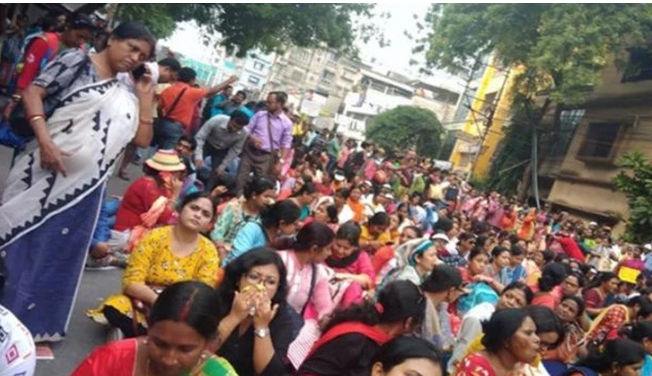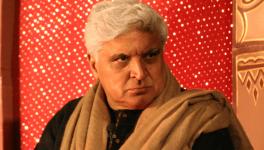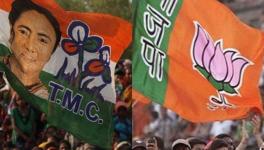Teachers’ Plight in W Bengal, Govt Apathetic

Image Courtesy: The Indian Express
At least 37 para-teachers from West Bengal have been on an indefinite hunger strike for nine days now, with thousands of others sitting outside Bikash Bhavan, state Education Minister Partha Chatterjee’s Salt Lake office in Kolkata. They are demanding that pay bands be introduced for their salaries. At present, the para-teachers receive a consolidated sum as pay and regular teachers get no benefits. If pay bands are introduced for para-teachers, they will be entitled to benefits such as a regular increment, dearness and medical allowances, and leave for child-care.
After nine days of hunger strike, several fasting teachers were hospitalised in critical condition. One protesting para-teacher suffered a brain stroke on November 21, and was taken to the hospital. Para Teachers’ Aikya Manch, the organisation spearheading the movement, has also alleged that one of the fasting para-teachers, Revati Raut, passed away on November 18 after she was taken to her home because of illness.
The state Education Department, however, has not acknowledged the plight of the protesting teachers. The education minister, or any officials of the department have not visited the protest venue, despite it being a stone’s throw away from the office. Forty-eight thousand para-teachers from across the state have also been boycotting schools since Monday, November 18.
Also Read: Bengal Para-teachers Continue Hunger Strike, Boycott Schools
Talking to NewsClick, Madhumita Banerjee, a leader of the movement, said, “The state government is completely indifferent to our issue. Yesterday, the principals of several government schools received an order to make a cut in the salaries of the protesting teachers. That is all they can do. They cannot take away our jobs, but they can take away a chunk of our already meagre salaries. We are not scared of them.”
On Friday, November 22, West Bengal governor Jagdeep Dhankhar appealed to all sides to initiate a dialogue to resolve the issue. He tweeted, “"@MamataOfficial. I appeal (to) all sides for dialogue at the highest level as over 1000 para-teachers are on a sit-in since November 11 and 37 of them are on an indefinite fast from Friday," he tweeted. Meanwhile, Lok Sabha witnessed heated arguments between treasury and opposition benches on Friday when BJP MPs from West Bengal raised the issue of the strike. When BJP MP Locket Chatterjee started speaking about the issue, TMC members rushed into the well saying she was misguiding the house, reported PTI.
There have been numerous protests against the West Bengal state Education Department in the current year. From School Service Commission (SSC) candidates to teachers employed in Shishu Shiksha Kendras (SSKs) and Madhyamik Shiksha Kendras (MSKs), from primary school teachers to para-teachers, everyone has been forced to raise their voice against the policies of the state government, and the residents of the state and members of the civil society have time and again spoken up in support of the protesters. But nothing seems to affect the Education Minister Partha Chatterjee and Chief Minister Mamata Banerjee, who have always remained, and continue to remain indifferent to the plight of the protesters.
The Education Department witnessed the beginning of the first statewide protest of the year on February 28, when 450 candidates who had applied for the post of assistant teachers and were on the waiting list of the SSC started an indefinite hunger strike that went on for 29 days, demanding that recruitments be made in the numerous vacant seats across schools in West Bengal.
Chief Minister Mamata Banerjee and Partha Chatterjee had maintained a stoic silence on their problems. Even when they were forced to address the issue, they did so with a certain disregard for the candidates, which enraged the striking protesters even more. Finally the hunger strike was withdrawn on March 28, after Mamata Banerjee assured them that the issues raised by them will be looked into immediately, and their demands will be met by the first week of June. Sheikh Insaan Ali, convener of the movement, had told NewsClick, “We are neither content nor assured yet, but we are hoping that the Chief Minister will abide by her words. With this hope, we are withdrawing our hunger strike for the time being. If she does not keep her promise, we will resume our hunger strike again after the first week of June.”
However, the chief minister did not keep her promise. The issues raised by the SSC candidates still remain unaddressed. CPI(M) central committee member and MLA Sujan Chakraborty wrote to Chief Minister Mamata Banerjee urging her to complete the process of recruiting higher secondary teachers within three months. He alleged large-scale corruption in recruitment of upper primary school teachers. “Even many of those who scored enough marks to clear the TET, their interview marks had been decreased due to malafide intentions,” he said. He also urged the chief minister to ensure steps for filling up the vacant posts as soon as possible.
This was not the only protest against the Education Department in the month of March. More than 30,000 teachers employed in Shishu Shiksha Kendras (SSKs) and Madhyamik Shiksha Kendras (MSKs) organised an agitation that lasted 7 days, demanding that their honorarium be increased. The SSKs and MSKs were established by the state government to bring underprivileged children within the ambit of the school education system. They are attended mainly by children from disadvantaged backgrounds, the privileged sections usually avoid these schools. SSKs and MSKs form a substantial part of the total number of schooling institutes in several districts of West Bengal.
Also Read: West Bengal Para-Teachers Start Indefinite Hunger Strike
Talking to NewsClick, Rekha Das Giri, an SSK teacher, or sahayika, as they are called, had said, “I have been working as an SSK teacher since 2003. Back then, our honorarium was Rs 1,000. The Left Front government gradually hiked it to Rs 5,954 by 2010. Our dearness allowance was also increased every three years. But the Trinamool Congress government has even stopped paying us the DA.” On July 26, the state government finally brought out a notification announcing a hike in the grade pay of SSK and MSK teachers across the state.
The primary school teachers from across the state have also protested time and again during the year, demanding hike in salaries. On July 12, thousands of primary school teachers started a huge movement, and 17 teachers went on an indefinite hunger strike.
Instead of acknowledgement of their struggle by the government, 14 teachers, who had been leading the movement for the increase in salary for a long time, were rewarded with transfers to schools far away from their residences, as a punitive measure by the state government.
The hunger strike and the protest continued for 18 days and was temporarily withdrawn after the West Bengal government had agreed to meet the demands made by the protesters, and revoke the transfer orders of the 14 teachers. However, yet again, the education department failed to keep the promise made to the teachers.
On November 6, the primary teachers were forced to come out on the streets demanding that Education Minister Partha Chatterjee fulfil his promise of increasing their salaries. The protest started on the morning of Wednesday, November 6, and continued through the night until the next morning. When the Communist Party of India (Marxist) [CPI(M)] leader Sujan Chakraborty went to meet the protesters, he was allegedly gheraoed by Trinamool Congress (TMC) goons and the police, and stopped from meeting them. The teachers continued to protest in a park in Jadavpur, and spent the night there. The police allegedly manhandled the teachers and detained a large number of protesters, who were taken to two different police stations. The state government continued to maintain their silence on the issue.
CPI(M), Students’ Federation of India (SFI), Democratic Youth Federation of India (DYFI) and Centre of Indian Trade Unions (CITU) have expressed solidarity with each and every movement that took place during the year, repeatedly raising their issues in different spheres. On Friday, November 22, CITU released a statement expressing solidarity with the protesting para-teachers. The statement read, “The para-teachers’ organizations have been demanding nothing more than a pay scale consistent with the service they are giving and other attendant benefits/allowances instead of paltry consolidated payment compared to regular teachers. Practically, given the huge vacancy of teachers lying unfilled in different schools in the state, the para-teachers have practically been shouldering the main responsibility of keeping the education institutions in the state running and functional. And in such a background, they are urging the government to ensure the implementation of same wages and benefits for the same work as available to the regular teachers in the state.”
Also Read: WB Para-Teachers’ Protest Enters Day 5, Govt Keeps Mum
Get the latest reports & analysis with people's perspective on Protests, movements & deep analytical videos, discussions of the current affairs in your Telegram app. Subscribe to NewsClick's Telegram channel & get Real-Time updates on stories, as they get published on our website.























